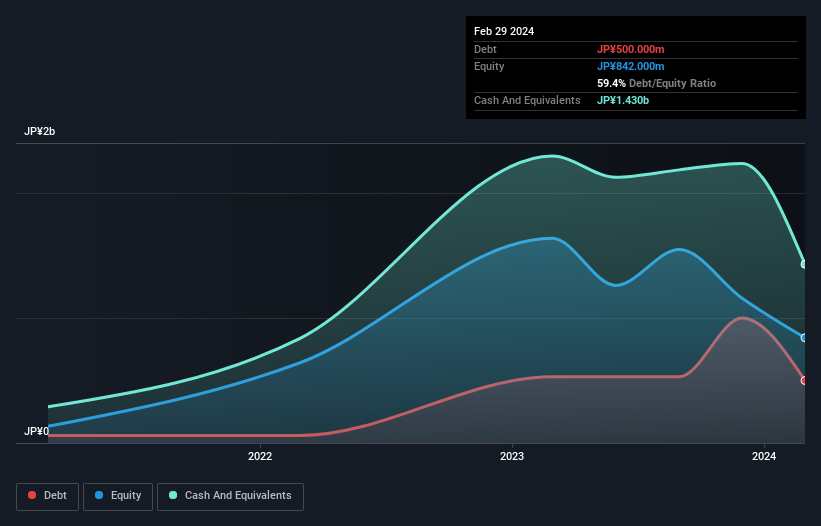Howard Marks put it nicely when he said that, rather than worrying about share price volatility, 'The possibility of permanent loss is the risk I worry about... and every practical investor I know worries about.' So it seems the smart money knows that debt - which is usually involved in bankruptcies - is a very important factor, when you assess how risky a company is. We can see that BASE FOOD Inc. (TSE:2936) does use debt in its business. But should shareholders be worried about its use of debt?
When Is Debt Dangerous?
Debt is a tool to help businesses grow, but if a business is incapable of paying off its lenders, then it exists at their mercy. Ultimately, if the company can't fulfill its legal obligations to repay debt, shareholders could walk away with nothing. However, a more common (but still painful) scenario is that it has to raise new equity capital at a low price, thus permanently diluting shareholders. Of course, the upside of debt is that it often represents cheap capital, especially when it replaces dilution in a company with the ability to reinvest at high rates of return. When we think about a company's use of debt, we first look at cash and debt together.
See our latest analysis for BASE FOOD
What Is BASE FOOD's Net Debt?
As you can see below, BASE FOOD had JP¥500.0m of debt at February 2024, down from JP¥530.0m a year prior. But it also has JP¥1.43b in cash to offset that, meaning it has JP¥930.0m net cash.

How Healthy Is BASE FOOD's Balance Sheet?
The latest balance sheet data shows that BASE FOOD had liabilities of JP¥2.40b due within a year, and liabilities of JP¥31.0m falling due after that. Offsetting these obligations, it had cash of JP¥1.43b as well as receivables valued at JP¥956.0m due within 12 months. So these liquid assets roughly match the total liabilities.
Having regard to BASE FOOD's size, it seems that its liquid assets are well balanced with its total liabilities. So while it's hard to imagine that the JP¥15.3b company is struggling for cash, we still think it's worth monitoring its balance sheet. While it does have liabilities worth noting, BASE FOOD also has more cash than debt, so we're pretty confident it can manage its debt safely. When analysing debt levels, the balance sheet is the obvious place to start. But it is future earnings, more than anything, that will determine BASE FOOD's ability to maintain a healthy balance sheet going forward. So if you want to see what the professionals think, you might find this free report on analyst profit forecasts to be interesting.
Over 12 months, BASE FOOD reported revenue of JP¥15b, which is a gain of 51%, although it did not report any earnings before interest and tax. With any luck the company will be able to grow its way to profitability.
So How Risky Is BASE FOOD?
By their very nature companies that are losing money are more risky than those with a long history of profitability. And we do note that BASE FOOD had an earnings before interest and tax (EBIT) loss, over the last year. Indeed, in that time it burnt through JP¥736m of cash and made a loss of JP¥856m. However, it has net cash of JP¥930.0m, so it has a bit of time before it will need more capital. BASE FOOD's revenue growth shone bright over the last year, so it may well be in a position to turn a profit in due course. Pre-profit companies are often risky, but they can also offer great rewards. The balance sheet is clearly the area to focus on when you are analysing debt. However, not all investment risk resides within the balance sheet - far from it. For example - BASE FOOD has 3 warning signs we think you should be aware of.
If you're interested in investing in businesses that can grow profits without the burden of debt, then check out this free list of growing businesses that have net cash on the balance sheet.
Valuation is complex, but we're here to simplify it.
Discover if BASE FOOD might be undervalued or overvalued with our detailed analysis, featuring fair value estimates, potential risks, dividends, insider trades, and its financial condition.
Access Free AnalysisHave feedback on this article? Concerned about the content? Get in touch with us directly. Alternatively, email editorial-team (at) simplywallst.com.
This article by Simply Wall St is general in nature. We provide commentary based on historical data and analyst forecasts only using an unbiased methodology and our articles are not intended to be financial advice. It does not constitute a recommendation to buy or sell any stock, and does not take account of your objectives, or your financial situation. We aim to bring you long-term focused analysis driven by fundamental data. Note that our analysis may not factor in the latest price-sensitive company announcements or qualitative material. Simply Wall St has no position in any stocks mentioned.
Have feedback on this article? Concerned about the content? Get in touch with us directly. Alternatively, email editorial-team@simplywallst.com
About TSE:2936
Excellent balance sheet with proven track record.
Market Insights
Community Narratives



